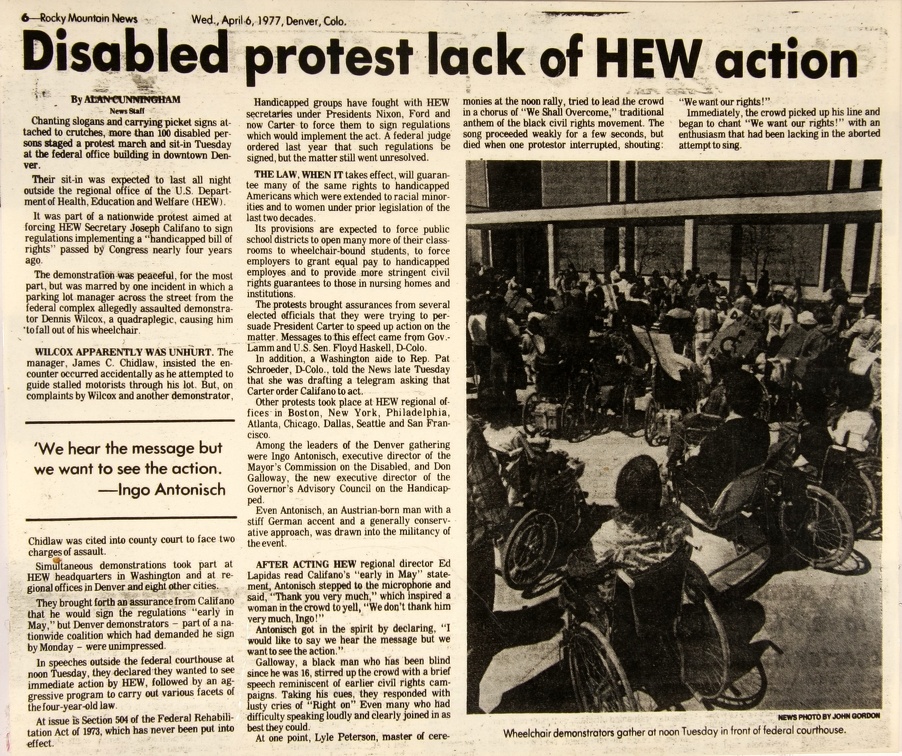- Ngôn ngữAfrikaans Argentina AzÉrbaycanca
á¥áá áá£áá Äesky Ãslenska
áá¶áá¶ááááá à¤à¥à¤à¤à¤£à¥ বাà¦à¦²à¦¾
தமிழ௠à²à²¨à³à²¨à²¡ ภาษาà¹à¸à¸¢
ä¸æ (ç¹é«) ä¸æ (é¦æ¸¯) Bahasa Indonesia
Brasil Brezhoneg CatalÃ
ç®ä½ä¸æ Dansk Deutsch
Dhivehi English English
English Español Esperanto
Estonian Finnish Français
Français Gaeilge Galego
Hrvatski Italiano Îλληνικά
íêµì´ LatvieÅ¡u Lëtzebuergesch
Lietuviu Magyar Malay
Nederlands Norwegian nynorsk Norwegian
Polski Português RomânÄ
Slovenšcina Slovensky Srpski
Svenska Türkçe Tiếng Viá»t
Ù¾Ø§Ø±Ø³Û æ¥æ¬èª ÐÑлгаÑÑки
ÐакедонÑки Ðонгол Ð ÑÑÑкий
СÑпÑки УкÑаÑнÑÑка ×¢×ר×ת
اÙعربÙØ© اÙعربÙØ©
Trang chủ / Đề mục / Thẻ march + sit-in
+ sit-in + Governor Richard Lamm
+ Governor Richard Lamm 1
1

 ADAPT (52)
ADAPT (52)
Rocky Mountain News, Wed., April 6, 1977, Denver, Colo. PHOTO by John Gordon: A large crowd of protesters, many in wheelchairs, are gathered outside a building. All are facing the building and a couple carry signs. Caption reads: Wheelchair demonstrators gather at noon Tuesday in front of federal courthouse. [Headline] Disabled protest lack of HEW action By Alan Cunningham Chanting slogans and carrying picket signs attached to crutches, more than 100 disabled persons staged a protest march and sit-in Tuesday at the federal office building in downtown Denver. Their sit-in was expected to last all night outside the regional office of the U.S. Department of Health, Education and Welfare (HEW) It was part of a nationwide protest aimed at forcing HEW Secretary Joseph Califano to sign regulations implementing a "handicapped bill of rights" passed by Congress nearly four years ago. The demonstration was peaceful, for the most part, but was marred by one incident in which a parking lot manager across the street from the federal complex allegedly assaulted demonstrator Dennis Wilcox, a quadraplegic, causing him to fall out of his wheelchair. Wilcox apparently was unhurt. The manager, James C. Chidlaw, insisted the encounter occurred accidentally as he attempted to guide stalled motorists through his lot. But, on complaints by Wilcox and another demonstrator, Chidlaw was cited into county court to face two charges of assault. Simultaneous demonstrations too part at HEW headquarters in Washington and at regional offices in Denver and eight other cities. They brought forth an assurance from Califano that he would sign the regulations “early in May," but Denver demonstrators — part of a nationwide coalition which had demanded he sign by Monday - were unimpressed. In speeches outside the federal courthouse at noon Tuesday, they declared they wanted to see immediate action by HEW, followed by an aggressive program to carry out various facets of the four-year-old law. At issue is Section 504 of the Federal Rehabilitation Act of 1973, which had never been put into effect. Handicapped groups have fought with HEW secretaries under Presidents Nixon, Ford and now Carter to force them to sign regulations which would implement the act. A federal judge ordered last year that such regulations be signed, but the matter still went unresolved. The law when it takes effect, will guarantee many of the same rights to handicapped Americans which were extended to racial minorities and to women under prior legislation of the last two decades. Its provisions are expected to force public school districts to open many more of their classrooms to wheelchair-bound students, to force employers to grant equal pay to handicapped employees and to provide more stringent civil rights guarantees to those in nursing homes and institutions. The protests brought assurances from several elected officials that they were trying to persuade President Carter to speed up action on the matter. Messages to this effect came from Gov.Lamm and U.S. Sen. Floyd Haskell, D-Colo. In addition, a Washington aide to Rep. Pat Schroeder, D-Colo., told the News late Tuesday that she was drafting a telegram asking that Carter order Califano to act. Other protests took place at HEW regional offices in Boston, New York, Philadelphia, Atlanta, Chicago, Dallas, Seattle and San Francisco. Among the leaders of the Denver gathering were Ingo Antonisch, executive director of the Mayor's Commission on the Disabled, and Don Galloway, the new executive director of the Governor's Advisory Council on the Handicapped. Even Antonisch, an Austrian-born man with a stiff German accent and a generally conservative approach, was drawn into the militancy of the event. After acting HEW regional director Ed Lapidas read Califano's "early in May" statement, Antonisch stepped to the microphone and said, "Thank you very much," which inspired a woman in the crowd to yell, "We don't thank him very much, Ingo!" Antonisch got in the spirit by declaring, "I would like to say we hear the message but we want to see the action." Galloway, a black man who has been blind since he was 16, stirred up the crowd with a brief speech reminiscent of earlier civil rights campaigns. Taking his cues, they responded with lusty cries of “Right on" Even many who had difficulty speaking loudly and clearly joined in as best they could. At one point, Lyle Peterson, master of ceremonies at the noon rally, tried to lead the crowd in a chorus of "We Shall Overcome," traditional anthem of the black civil rights movement. The song proceeded weakly for a few seconds, but died when one protestor interrupted, shouting: "We want our rights!" Immediately, the crowd picked up his line and began to chant "We want our rights!" with an enthusiasm that had been lacking in the aborted attempt to sing. BOXED TEXT: We hear the message but we want to see the action. -- Ingo Antonisch